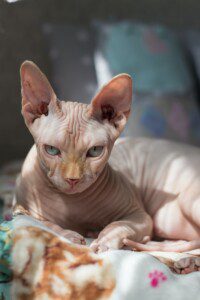Cat Wednesday 2023-04-05
Having cats as pets can be a great source of companionship and comfort. Not only do cats provide unconditional love and affection, but they can also help improve your mental health. Studies have shown that having cats as pets can reduce stress levels, lower blood pressure, and even increase feelings of happiness and well-being. Cats can also help us feel more connected to nature, as they are an important part of the natural world. In addition to providing physical and mental health benefits, cats can also bring joy into our lives with their playful personalities and amusing antics. By providing us with companionship, comfort, entertainment, and relaxation, having cats as pets is an excellent way to enhance our lives and improve our mental health. – Editorial Team
Donskoy Cat

Introduction:
The Donskoy cat, also known as the Don Sphynx or Russian Donskoy, is a relatively new breed of hairless cat that originated in Russia in 1987. This unique breed has gained popularity around the world due to its striking appearance and friendly temperament. In this report, we will provide pertinent information about the Donskoy cat, including its history, physical characteristics, personality, health concerns, and grooming requirements.
History:
The Donskoy cat was first discovered in 1987 by Elena Kovaleva in the city of Rostov-on-Don, Russia. The first Donskoy cat was a hairless male kitten that was born to a black and white domestic cat. The kitten was named Varvara and was found to have a genetic mutation that caused it to be hairless. The mutation was later found to be a dominant gene, meaning that any offspring of a hairless Donskoy cat will also be hairless.
Over time, breeders began to selectively breed hairless Donskoy cats to other cats with and without hair, which led to the development of the breed as we know it today. The breed was recognized by the World Cat Federation (WCF) in 1997 and the International Cat Association (TICA) in 2005.
Physical Characteristics:
The Donskoy cat is a medium-sized cat with a muscular and athletic build. Its most distinctive feature is its lack of fur, although some Donskoy cats may have a fine downy coat. The skin of the Donskoy cat is wrinkled and soft to the touch, giving it a unique and unusual appearance. The cat’s head is wedge-shaped, with large ears that are set wide apart. The eyes are almond-shaped and can be any color, including blue, green, yellow, or brown.
Personality:
The Donskoy cat is known for its friendly and affectionate personality. It is a social cat that enjoys being around people and other pets. Donskoy cats are intelligent and playful, and they have a great sense of humor. They are also known for being loyal and devoted to their owners, often following them around the house like a dog.
Health Concerns:
Like all cats, the Donskoy cat is prone to certain health conditions. Hairless cats, in particular, may be more susceptible to skin infections and sunburn. It is important to keep the Donskoy cat’s skin clean and moisturized to prevent dryness and irritation. Donskoy cats may also be prone to heart disease and hypertrophic cardiomyopathy.
Grooming Requirements:
Due to its lack of fur, the Donskoy cat has very little grooming requirements. However, it is important to keep the cat’s skin clean and moisturized. Bathing once a month with a gentle shampoo is recommended, and the skin should be moisturized with a skin lotion or oil to prevent dryness. Donskoy cats may also need to have their ears cleaned regularly to prevent wax buildup.
Conclusion:
In conclusion, the Donskoy cat is a unique and fascinating breed that has gained popularity around the world. Despite its unusual appearance, the Donskoy cat is a friendly and affectionate pet that makes a great companion. While it may require some special care due to its lack of fur, the Donskoy cat is a low-maintenance pet that is well-suited to a variety of lifestyles.

